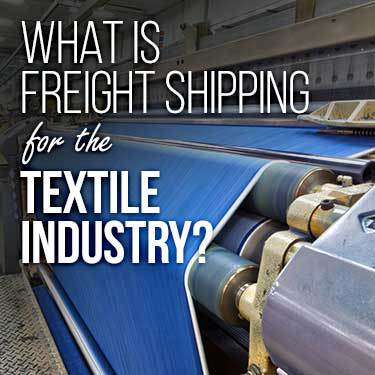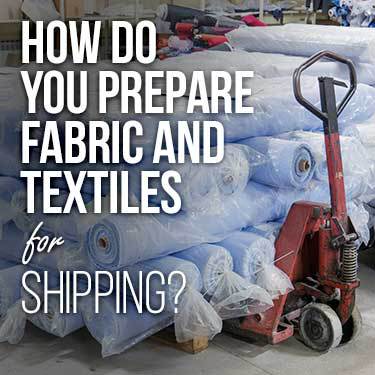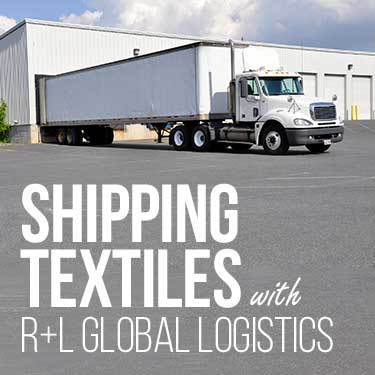No matter whether you’re shipping from a port or a plant, there are a few challenges associated with shipping for the textile industry. Problems with shipping and transport can lead to disruptions along your supply chain, but finding the right solutions can keep your textile business moving.
Shipping for the textile industry involves the transport of fabrics and finished garments and products. One common way to move textiles across the country is by freight truck. You might opt to ship an entire truckload of textiles with full truckload shipping or just a few pallets via less-than-truckload shipping.

Freight shipping for the textile industry involves transporting products. You’ll likely choose freight shipping if your products exceed typical parcel shipping dimensions and quantities.
One common method of transporting textiles includes full truckload shipping, also known as FTL. Your business might opt for FTL when you have a large amount of textiles to move across the country or across the region. You might opt for FTL when your textile shipment is more than a few pallets or weighs more than 15,000 lbs. If you are shipping less, you might opt for less than truckload (LTL) freight. Rates for LTL freight are determined by freight density and how goods are classified. Ocean shipping and air freight are also options.
If you are a textile manufacturer, you might use FTL or LTL shipping to move products from the plant to a warehouse, retailer, or even another manufacturer. You might also ship your textiles directly to your consumer.
In most cases, textiles are shipped in a dry van. This type of trailer is one of the most common modes of freight transport on the roads today. A dry van trailer will protect the fabric from the elements and ensure safe travel.
Freight shipping service is often a cost-effective transport solution, especially when compared to parcel shipping. There are other benefits associated with shipping goods via truckload and freight. In fact, choosing the right freight partner for your fabric and textiles can help you overcome challenges and keep your supply chain strong.

No matter when kind of textile you’re shipping, preparation is similar. Yarn, thread, fabric, towels, bedding, and other textile goods should be prepared for shipping by being palletized. Uniform pallets will make the storage and transport of your textiles easy.
When shipping fabric or cloth, rolls or bolts of material are placed on a pallet. They might be stacked and then covered in plastic wrap for shipment. A roll might hold 50 yards of fabric; a bolt might hold 15 yards of fabric. Finished textile products, like towels or sheets, might be placed in boxes or crates before they are palletized. Cloth, fabric, and textiles should be clean and dry before palletized.
According to information from the Federal Trade Commission, textiles and textile products should be carefully labeled. The country of origin and fiber content should be indicated for each item. This information can come in handy when shipping textiles, as your carrier might require this data to be included in the Bill of Lading.
If you are shipping textiles or fabrics via LTL freight, you’ll need to know the product’s freight class before shipping. Freight class is based on density. Cotton or synthetic cloth on rolls or bales is typically freight class 85. Finished textile goods, like clothing garments, might be freight class 175.
Freight class is a factor in determining the cost of your LTL shipment. Other factors in determining freight shipping cost, regardless of whether you are shipping LTL or FTL, include:

Overcoming the challenges associated with shipping for the textile industry can help you keep your supply chain strong.
Challenges associated with shipping for the textile industry might include finding competitive rates, finding the best carriers, ensuring on-time delivery, and proper documentation and preparation.
The solution to overcoming these challenges is simple: choose a strong freight partner. In fact, you’ll likely find that the right freight partner can help you keep costs down and keep profits up. Dependable delivery will keep your supply chain moving. Choosing a strong logistics partner will also help your inventory pipeline and will allow you to better serve your customers.
Want to learn more about shipping wool? Check out our article How to Ship Wool.

Finding the right freight solution is easy with R+L Global Logistics on your side. We are well versed in shipping for the textile industry and can help your business excel with our array of 3PL services. From full truckload shipping to warehousing to fulfillment and distribution, R+L Global Logistics is ready to be your strategic ally.
Supply chain management in the textile industry requires careful planning. No matter whether you’re moving raw materials to the plant or a finished product to a retailer, leave the legwork to R+L Global Logistics.
You’ll find many logistics companies in the marketplace today, but few are as ready as we are to go to work for you. R+L Global Logistics comes with a proven record of 99.5% on-time delivery, with transparent tracking to keep you informed each mile of the journey.
Additionally, R+L Global Logistics offers the shipping solutions your business needs. Our services are diverse. Count on us when you need:
R+L Global Logistics has friendly freight agents standing by to get a truckload freight quote ready for your business. Let us be your strategic partner when you need freight shipping for the textile industry.
R+L Global Logistics
315 NE 14th St., Ocala, FL 34470